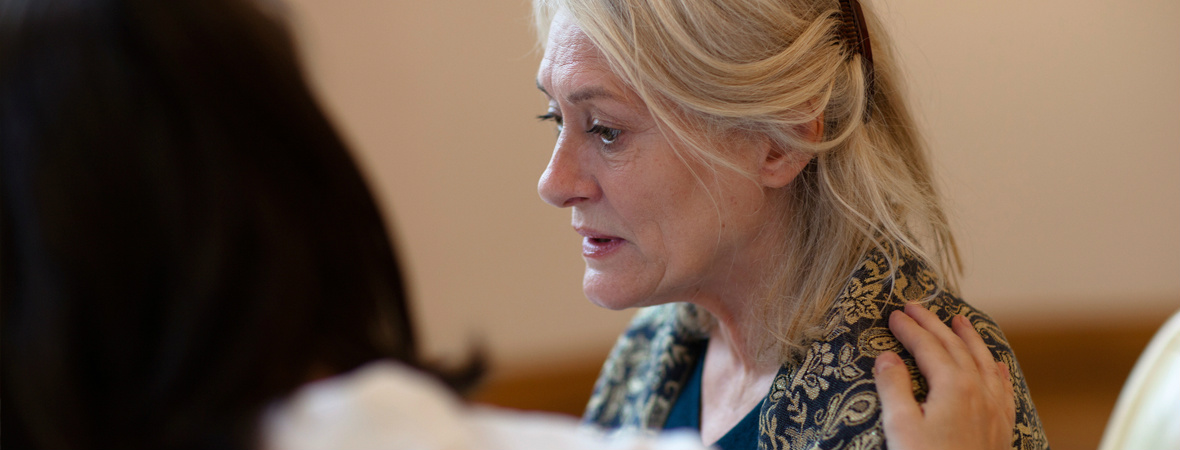We understand you have many questions about hospice care. If your concerns are not addressed in the questions below, don’t hesitate to call us at any time.
Click on a question to view the answer.
What is Hospice?
Hospice is a proven method of care designed to maximize comfort and quality of life for individuals with a life-limiting illness who are not seeking aggressive treatment. The goal of all hospice care is the relief of symptoms in order to promote comfort and improve a patient's quality of life.
Patients receive pain and symptom management, by blending contemporary science and complementary medicine with sensitive caring in accordance with their own wishes. You or your loved one will received emotional and spiritual support as well. But hospice is not just for the patient. Family members and caregivers are equally important, and receive ongoing education and support. Our trained professionals and volunteers work together with family members to offer comfort and dignity during the final days.
Improving the final days of you or your loved one is the purpose of hospice care. Given that hospice is palliative and not curative easing the symptoms of illness with specific attention on pain management is our goal. Our expert team addresses the spiritual, and emotional issues that will be faced. Keystone’s compassionate team of professionals and volunteers cohesively work with family member to ensure comfort and dignity during the final days.
What support does hospice offer patients living at home?
Hospice care provided in the home for you or your loved one will be provided by a specialized team of physicians, nurses, social workers, counselors, hospice certified nursing assistants, clergy, therapists and volunteers. All medications related to the terminal condition (including pain medication), supplies, equipment, personal care and hospital services are all supplied by Keystone. In addition, relief therapies such as massage, acupuncture, reading, reading, spiritual and grief counseling are offered by Keystone. Additional home help is available as needed.
When should I consider hospice?
It may be time to consider hospice care when aggressive efforts to treat a life-limiting illness or disease creates more distress, pain and harm than good. The hospice referral process does require a physician’s order, however, you or your loved one may suggest it at any time as part of your care options. Doctors may wait for families to bring hospice up. This is part of the reason that people often receive hospice care so late in the process. If you think you or your loved one and family might benefit from the support of weekly home visits from staff who specialize in pain control and the easing of distress, ask your doctor if hospice might be the right choice.
Those not quite ready for hospice care may benefit from our Keystone Transitions program with our sister company, Keystone Housecall. Care and treatment can be received in-home while still seeking aggressive treatment for illnesses. For more information visit www.keystoneidaho.com, or call 208-514-0670.
How is hospice care different from other types of home health care?
Hospice isn’t a curative approach, instead it focuses on focuses on pain control and making the final days of you or your loved one comfortable. The Keystone team coordinates and supervises all care 7 days a week, 24 hours a day. This team is responsible for making sure that all involved services communicate information. This may include the inpatient facility, the doctor, and other community professionals, such as pharmacists, clergy, and funeral directors. Hospice care assures you and your family that you are not alone and can get help at any time.
Where does hospice care take place?
Hospice is a philosophy, not a place, as a result patients may receive hospice care wherever you call home. If you live in a skilled nursing facility, assisted living, a friend’s home, or the home the you’ve spent your life in, Keystone will be there.
Who is eligible to receive hospice care?
When individual diagnosed with a serious, life-limiting or terminal illness is no longer benefiting from aggressive curative treatments they become eligible to receive hospice care.
Can a hospice patient who shows signs of recovery be returned to regular treatment?
Patients can stop hospice treatment at any time they wish and return to a curative-based approach if they feel that will benefit them more. If a new treatment has been discovered, or signs of improvement, rather than decline are present a patient has the choice to opt out of hospice-for any reason. If viable signs of recovery are seen, the hospice team may even be the ones to recommend discharge from hospice.
Is there any special equipment or changes I have to make for hospice care provided in home?
Our hospice staff will conduct an evaluation examining your needs and arrange for any necessary equipment (e.g. hospital bed, wheel chair, oxygen, etc.)—generally at no cost to you once you have decided on hospice care.
Can a hospice patient who shows signs of recovery be returned to regular treatment? Can I be released from hospice care?
Of course. If your condition, or the condition of your loved one, improves or the disease moves into remission, you can be discharged and return to curative therapy and normal daily life. If there is a need to return to hospice care again, Medicare and most private insurance providers will allow additional coverage.
Is there any special equipment or changes I have to make for home hospice care?
Our hospice staff will assess your needs and arrange for any necessary equipment (e.g. hospital bed, wheel chair, oxygen, etc.)—usually at no cost to you once you have decided on home hospice care.
How does hospice handle pain management?
Even the smallest amount of pain relief can feel like a miracle for most hospice patients. Keystone Hospice is dedicated to providing pain management service and comfort to those who are suffering. We believe if an approach can provide even five minutes of relief it is worth doing. Our unique holistic approach combines traditional medicine, and methods, with complementary medicine. Keystone offers, massage therapy, aromatherapy, craniosacral therapy, reflexology, music therapy, and other modalities proven to alleviate pain and discomfort.
How successful is Keystone in managing pain?
Keystone has a strong success rate with pain management. With our combination of medication, counseling and therapy—as well as complementary and alternative medicine— patients find significant relief, peace of mind, and comfort.
Does the hospice patient always need someone with them?
During initial stages of hospice care, constant monitoring is typically unnecessary. Nevertheless, one of the most common fears faced by those approaching the end of life is the fear of dying alone, so we usually suggest someone be continuously present in later phases of care.
How frequently Keystone Hospice care provider visit?
In efforts to provide the highest quality of care to you or your loved one we do not limit the number of visits. Our low nurse-to-patient ratio allows us to visit more often than other hospices. We will visit as often as needed.
Will the same nurse or therapist visit regularly or will it be someone different every time?
We believe in the best cares comes from consistency. A core team of care providers is assigned to each of our patients. While a different Keystone Hospice aide may come out depending on the time of the visit (e.g. late at night or on weekends) they will always be a member of your core care team.
How quickly can hospice care begin?
Almost always hospice care can begin the same day we are contacted. For those in need of urgent admission a hospice team (consisting of a registered nurse, social worker and any other necessary team members) can begin hospice admission within two hours of receiving a physician order.
By choosing to use hospice services in the nursing home, will the nursing home staff feel they weren’t doing a good job?
The ongoing expertise in geriatric and chronic illness care the nursing home staff provides is one part of the treatment plan. The other part is the hospice specialized pain and symptom management Keystone provides.
By working in tandem, you or your loved one will have all of their needs met.
Is using hospice the same as giving up? Does it mean that there’s nothing more the doctors can do?
Managing your loved one's pain and symptoms and addressing what’s important to your family is not giving up. Some people delay getting help because they simply don't understand everything hospice offers or they feel it's for the very end-of-life. Keystone Hospice will help your family cope with the physical, emotional, and spiritual impact of a life-limiting illness. With their expert guidance on what to expect in the coming months, weeks and days they'll explain all of your options. Your hospice team will manage all medications, supplies, and services to support your family as an illness progresses, and in assist in making the most of every moment together.
When active curative treatments cease to work physicians and patients turn to hospice. The focus transitions to providing comfort and on making each day count. Hospice provides palliative treatment and expertise in controlling physical symptoms to ensure you or your loved one remain comfortable and functional for the best possible quality of life.
Can a hospice patient continue with his or her own doctor?
Absolutely. Keystone’s medical director is available for consultation with the patient's physician. Our nurses will coordinate with your doctor on all aspects of care.
What if people involved in the patient's care aren't actually family?
Keystone works with wide variety of caregiver situations. Whomever you call family, we will support you.
Can hospice care only be provided in a home?
No. Although most hospice care is provided in an individual’s home; we will visit wherever you call home, whether it’s a nursing home, assisted living facility, or your home, our hospice team will come to you.
Which services are provided by Keystone Hospice to family or loved ones?
All hospice programs make bereavement services available to family and loved ones for a minimum of 13 months following the passing of a patient. Services may come in the form of support groups, educational forums, phone calls, information on the grief process, as well as assessment of needs. We can also make referrals to community resources and/or assistance with memorial services.
At Keystone, our focus is on the entire family. We understand relationships of trust are established during the hospice process and feel recovery and grief support benefits from consistency. Your Keystone Hospice care provider will maintain contact with your family for at least a year after death. Many times the relationship continues for much longer.

